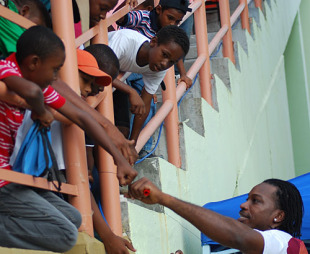 The spectre of match-fixing is once again hanging uneasily over cricket and the ICC will be alert to anything untoward during the World Twenty20 in the West Indies, but remain confident they have robust processes in place to keep the game clean.
The spectre of match-fixing is once again hanging uneasily over cricket and the ICC will be alert to anything untoward during the World Twenty20 in the West Indies, but remain confident they have robust processes in place to keep the game clean.
Rumours abound in India in the wake of the controversial finish to the IPL - all, currently, unproven - while English domestic cricket was recently rocked when it was revealed that two Essex players were under investigation for spot fixing during a Pro40 match last year. Such allegations have raised concerns that the integrity of the game is at stake in the most serious way since the Hanise Cronje scandal in 2000.
With the eyes of the cricket world now trained on the Caribbean it is imperative that the tournament is free from controversy and the game's global governing body continues to put full faith in its Anti Corruption and Security Unit (ACSU) which was set-up in the wake of events 10 years ago and which the IPL has refused to use.
"The risk posed by corruption in cricket remains real and even though the ACSU has been hugely successful in combating those who want to harm our great sport, it doesn't mean we can be complacent," an ICC spokesman told Cricinfo. "Everyone involved in cricket must be vigilant and ensure that potential corruptors continue to be marginalized and pushed away from the game.
"The unit continues to be at the forefront of fighting corruption in cricket and also educating the players on the risks and responsibilities. As other sports bodies realise the importance of anti-corruption, the ICC's ACSU is often where they look for advice in how to do that."
Since the ACSU's inception in 2000 it has been led by Paul Condon, the former commissioner of the Metropolitan Police. But the ICC is now on the hunt of a new leading man with Condon set to retire in June after a decade of service. However, the ICC has said suggestions that Ravi Sawani, the chief investigator of the ACSU, has also handed in his resignation are wide of the mark.
"I am glad to say there is no truth in the rumour that Ravi Sawani is leaving," the spokesman said. "He is committed to remaining in the job until after the ICC Cricket World Cup 2011 at least and that is good news for the game.
"Ravi is a vastly experienced investigator and has been an excellent addition to the ICC's Anti-Corruption and Security Unit since he took over two years ago."
Evidence that no one can be complacent about the international game now being clear of potential match-fixing came at the previous World Twenty20 in England last June when two Australian players were approached at the team hotel in London. The management immediately reported the incident to the ICC, but bookmakers are becoming ever more clever about how they aim to tap the market while the ease of access to matches, through satellite TV and the internet, makes it a vulnerable time.
News Source
Categories:
T20 Cricket News
Subscribe to:
Post Comments (Atom)
0 Response for the "ICC alert to match-fixing threat"
Post a Comment